The Book of James: Does faith justify the life that claims it?
Thursday March 2, 2023
Title: The Book of James: Does faith justify the life that claims it?

A man is running for mayor of Portland (Oregon). Rail Gib says that he believes in fairness and fair laws. He says that he believes in law and order and low taxes. He says he believes in limited government and the original interpretation of the Constitution. He is tough on crime and high on a solid civic and classical education for our children. He wants to make our schools better and safer. He says that he sees through all the woke nonsense and will work to return our leadership to a foundation of character, talent, and ability. He says this again and again as he runs for public office. Everywhere he goes he carries the slogan, “Back to Basics.” It’s on his hat and his buttons and his banners. He doesn’t even have to say much about it anymore because he’s known for it. Just his presence stands for conservative values.
What is your first reaction? He doesn’t have a prayer of getting elected in Oregon. But let’s say that the people of Portland and Eugene have had it with the crime, homelessness, and incompetence. They are finally ready for a change, and this man is the one their leaning towards. He’s even ahead in the poles. We who live outside of those cities wait with bated breath.
We should pray for him and us.
Let’s leave our fictitious politician aside for a time.
Save your life – care for your life (eternal life, Christ’s life) for the preciousness it is.
James writes of the bringing forth of sin that matures into death.
James’ theme of death.
Sin brings forth death (1:15).
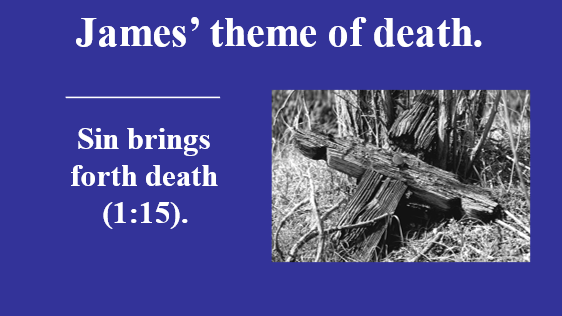
He also writes of the bringing forth of our new lives by God which God calls His first fruits.
Care for the holy gift of your spiritual life by receiving the Word implanted which is able to save your life.
James’ theme of “save” is the experience of this life.
God brought us forth by the word of truth (first fruits; 1:18).
God gives the Word to obey to save our earthly lives (1:21).
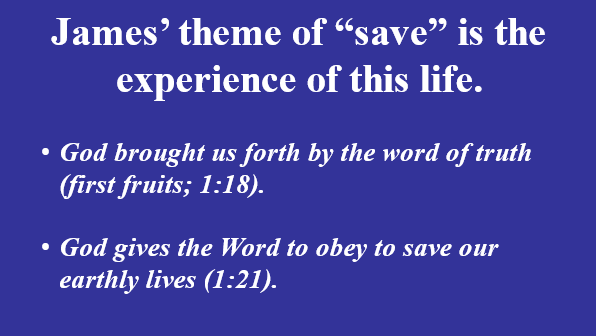
Jam 1:21-25
Therefore, putting aside all filthiness and all that remains of wickedness, in humility receive the word implanted, which is able to save your souls [lives].
Saving of your life gets right back to how James opened this paragraph.
Jam 1:12
Blessed is a man who perseveres under trial; for once he has been approved, he will receive the crown of life which the Lord has promised to those who love Him.
Crown of life is not justification, but a justified life.
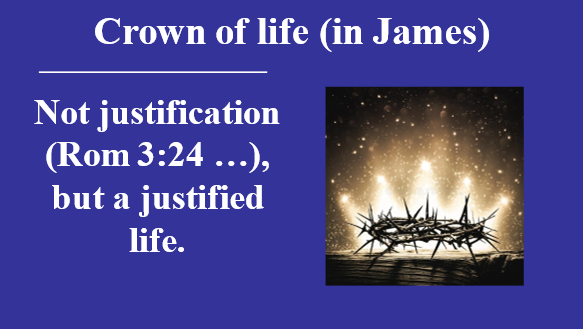
Let’s return to our faithful politician, Rail Gib. He gets elected! Our politician gets elected mayor of Portland and we can’t believe it. We might be able to go out to eat in Portland again! Even at night! We’re excited. We almost expect the changes overnight, but we’re smarter than that. We know it will take time. So, we expectantly wait.
Jam 2:14
What use is it, my brethren, if someone says he has faith but he has no works? Can that faith save him?
The question in Greek implies its own answer and might better be translated, “Faith can’t save him, can it?” The expected response is, “No it can’t.”
But James has already stated that his listeners are God’s children, brought forth by His word – His first fruits. James certainly knows that faith saves, so what is he after here? Just what we saw prior. The saving of our lives in time (the crown of life in time).
We have to admit at the start of the “sticky passage” that James is in fact saying that works is a condition for salvation. So call it a “right strawy epistle” along with Martin Luther, or, admit that James isn’t talking about salvation by grace through faith at all. He’s talking about a salvation based on works.
Saved in vs. 14 begs the question, “Saved from what?”
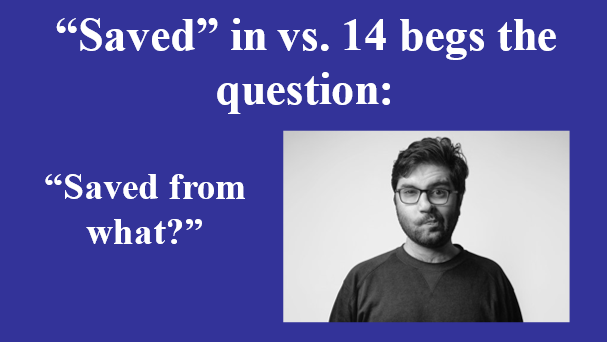
The truth is the theme of the letter. The truth is that obedience to God’s Word can “save” the life from the deadly outcome of sin. Faith alone cannot do this. Works of obedience are completely indispensable to a life that conquers.
In the “sticky” passage of Jam 2:14-26, James is simply elaborating on the principles he has already laid down in chapter 1 – life and death experience of the Christian who is under trial.
Jam 2:15-16
If a brother or sister is without clothing and in need of daily food, 16 and one of you says to them, "Go in peace, be warmed and be filled," and yet you do not give them what is necessary for their body, what use is that?
Well, we’ve been waiting over a year and Mayor Gib it turns out was a lot of hot air. He didn’t do any of the things he said he was going to do. He was just as leftist and greedy as the past mayors and it turns out he was only saying that he was for certain things to get elected. He wet his finger, held it to the air, sensed the winds were changing and told people want they wanted to hear.
The believer, being of Christ, being of the faith, has given himself to a life of gracious giving. That’s what his faith says. If he is asked, as a born-again Christian, should you give to those in need if you have it to give? He would proudly respond with a resounding yes. He is in Christ after all. But when it came time, and a person with legitimate needs came to them and asked for clothing and food, of which our Christian man had enough to give, and we stood and watched as he said, “Go in peace, be warm (without any of my several jackets or sweaters) and be filled (without any of my food that I have a fridge and pantry full of),” James asks, “What good is that?”
What good was Mayor Rail Gib? Of no use to us at all. Thanks for nothin’.
As a matter of fact, it is worse than nothing. It is callous because Rail promised it.
So faith by itself, as James presents it in his letter, is akin to Mayor Gib misleading us. The analogy is not perfect. No analogy is. But I use it to illustrate and hopefully for us to remember what this passage means.
Christians believe in Christ and as a result they are new selves, God’s first fruits. That new life comes with a whole bunch of wonderful things that need to be lived out. And if they’re not lived out, James calls it “death.” If they are lived out, James calls it “the crown of life.”
In the context of the New Testament, it is not odd for James to call a believer’s life ruled by sin as death, even though the believer has eternal life.
Remember in our study of the filling of the Spirit, we saw in Eph 5:18, “do not be drunk with wine, for that is “prodigal,”
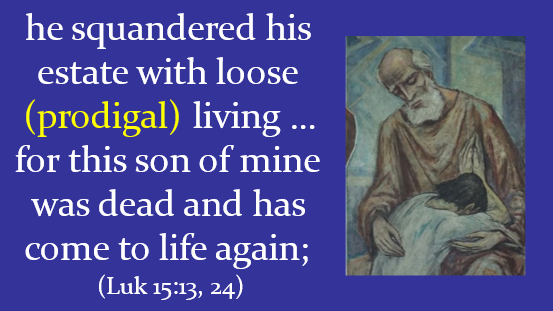
Luk 15:13, 24
he squandered his estate with loose living … for this son of mine was dead and has come to life again;
Let’s say that Mayor Gib really did mean to do what he said, but when he got into city hall he found out that there was a lot of opposition. He found out that most people didn’t want him to make those changes because it was going to hurt their nefarious dealings. He found out that the press was ready to lie about him, try to ruin his reputation, make all kinds of untrue accusations. He lost friends and even some family. So, he was at a cross roads. What would he do? He’s been in office a year. He’s got three more. He still has time. Maybe he’s considering it, and that puts him at a watershed moment. What would you do?
The Christian life has “various trials,” and it will often hurt to be gracious and do God’s will. If we don’t, it is death.
If he folds under the pressure and gives in, does what the old establishment wants him to so his life can go back to comfortable and calm, then he has not done what he claimed.
Mayor Gib had a death, but not to himself. His death was a dead idea, a dead promise, a dead term, and he was dead wrong in his decision. Death is a more complex term than either physical death or spiritual death.
This is what James means by death. It is a darkened life leading to eventually to a dark tomb. And that, for a saved Christian.
This is the first book written that God would include in His New Testament. Before theology, Christology, and more details about doctrines are written down in other letters, God is sure to impress upon us that the Christian life was never meant to only be believed or assented to, agreed with, applauded even; it was meant to be lived and if we don’t then we don’t live life. Rather we live sterile, ineffectual, unproductive lives that have nothing to do with the name Christian.
A quote from Dibelius [German theologian], “But in all of the instances [in James] … what is involved is the faith which the Christian has, never the faith of the sinner which first brings him to God … The faith which is mentioned in this section can be presupposed in every Christian … James’ intention is not dogmatically oriented, but practically oriented: he wishes to admonish Christians to live their faith, i.e., their Christianity, by works.”
James will now introduce the word “justified.”
The sticky part gets a bit stickier.
Jam 2:24
You see that a man is justified by works and not by faith alone.
But if James isn’t writing about saving for eternal life but saving our lives in time. If he’s not writing about spiritual death, but is using death as a term for a Christian who does not wear the crown of life, then why would we assume that in the word justification, he is referring to salvation? The clear answer is that we would not.
We’ll get to that.
Rail Gib did not do what he said. He promised to do a lot of things he never did. He had the chance to do it, but the work was too hard and the pressure too high. He gave in and did what his conscience told him to stand against.
Was Mayor Rail Gib justified?

….
[Perhaps mercy and the JSOC on Sunday]
James 2:8-13
If, however, you are fulfilling the royal law according to the Scripture, "YOU SHALL LOVE YOUR NEIGHBOR AS YOURSELF," you are doing well. 9 But if you show partiality, you are committing sin and are convicted by the law as transgressors. 10 For whoever keeps the whole law and yet stumbles in one point, he has become guilty of all. 11 For He who said, "DO NOT COMMIT ADULTERY," also said, "DO NOT COMMIT MURDER." Now if you do not commit adultery, but do commit murder, you have become a transgressor of the law. 12 So speak and so act as those who are to be judged by the law of liberty. 13 For judgment will be merciless to one who has shown no mercy; mercy triumphs over judgment.
Use context of rich and poor in 2:1 ff, behavior in chapters 3-4.